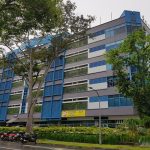Although Grade A office leasing activity remained sluggish in 3rd Quarter some vacant spaces were taken up
- Grade A office leasing activity remains sluggish in Quarter 3
- Grade A office leasing activity continues to decline 5.1 per cent quarter-on-quarter to $9.84 psf/month in Q3 2020 in line with the weak market sentiment amid the worst recession on record
- Chinese firms may play sizable role in Grade A office leasing activity
- Downward pressure from the recession and a prolonged period of work from home has resulted in a net reduction in Grade A office leasing activity

Grade A office leasing activity comes to a halt in the third Quarter or 2020
Table of Contents
Leasing activity came to a halt in the third quarter of 2020 despite the circuit breaker easing into Phase 2 in the middle of June. The pace of occupiers taking up space in the Grade A CBD area remains sluggish. Tenants with leases expiring in the immediate horizon are seeking short term renewals in the face of business uncertainty. Office space is under-utilised as work from home remains the default. As a result, firms are undertaking workplace strategy studies to determine their future office needs. In the immediate to short term, the market is expecting a fraction of space to be returned vacant when occupiers renew their leases.
Nevertheless, some vacated spaces are being taken up by other occupiers who are seizing the opportunity to lease prime space at more attractive rental rates. For instance, QBE Insurance is relocating to Guoco Tower and taking up 31,000 sf of space vacated by Grab, which is moving to one-north. In addition, Amazon is leasing 90,000 sf across three floors at Asia Square Tower 1 which Citi is giving up.
Mark Lampard, Executive Director and Head of Singapore Commercial Leasing and Regional Tenant Representation said “Allowing half of an organisation’s workforce return to office is a game changer – this scenario gives companies a critical mass to truly assess their agility model going forward. Up to now, companies were not prepared to make decisions as no one was in the office. The market has taken the first step in the return to liquidity, driven by companies seeking smaller requirements and giving up space”.
Grade A CBD Rents Continued to Decline
Grade A CBD rents continued to decline by 5.1 per cent quarter-on-quarter to $9.84 psf/month in Q3 2020 in line with the weak market sentiment amid the worst recession on record. Geopolitical tensions have nudged Chinese tech firms to pivot to Singapore, taking up office space in the city-state. ByteDance is planning to make Singapore its regional hub for its expansion into the rest of Asia and has applied for a license to operate a digital bank here.
Similarly, Tencent has also chosen Singapore as its hub for its growth in Asia and has plans to open a new office here. Another bright spot is the upcoming redevelopments of AXA Tower and Fuji Xerox Tower in 2021, which will displace 700,000 sf and 354,000 sf of office spaces respectively.
There were approximately 350,000 sf of new leases and expansions in office spaces by tech firms since the start of the year, based on Cushman & Wakefield’s estimates. The firm is projecting take up by tech firms to increase to 400,000 – 500,000 sf in 2021.
Christine Li, Head of Research, Singapore and Southeast Asia said “Should more Chinese tech firms adopt the same approach, we expect more movement in the Grade A market, particularly developments with large floor plates as these firms tend to favour such space specifications. The Marina Bay submarket has a sizeable footprint of offices that match these requirements.”
The office market heads into the fourth quarter of 2020 with significant challenges. The prevalence of staff working from home is expected to remain widespread in the short to medium term. The office sector will be reshaped by the increase in the remote working trend due to structural impacts, which will impact the leasing demand in the next 12-18 months. In addition, there has been a rise in retrenchments due to the recession, with a number of banks and energy firms giving up space. The full-year rental change is still projected to be -10 per cent in 2020 with a further decline to be expected in 2021.
“The downward pressure from the recession and a prolonged period of work from home has resulted in a net reduction in office take up overall” Mr Lampard added.
Cushman & Wakefield’s report on office leasing activity mirrors that of Colliers International
Colliers International, on October 7th published its latest research report which examines the office leasing market demand, the performance of the Singapore office property market in Q3 2020 and its prospects ahead. Evaluating the data, Colliers Research notes that CBD Grade A gross effective rents continued to moderate further by 2.3% quarter-on-quarter (QOQ) to S$9.77 per square foot (psf) in Q3 2020, while Grade B rents slid 2.4% QOQ.
The report said: “As expected, CBD Grade A vacancy expanded to 4.9% in Q3 2020 from 4.6% the previous quarter, as incremental new take-ups in recently completed buildings were negligible. Meanwhile, vacancies edged up in all micro-markets except Raffles Place/New Downtown’s premium buildings. Demand driver in Q3 2020 continues to come from flexible workspace which had been previously committed.”
The report noted that Singapore remains attractive to investors despite a 35.8% QOQ decline in the total office or mixed office investment volumes to S$846 million in Q3 2020, which brings the rolling 12-month volume to S$4.0 billion, a 34.5% decline QOQ. Robinson Point was sold by Tuan Sing Holdings at the highest price on psf basis in the third Quarter.






